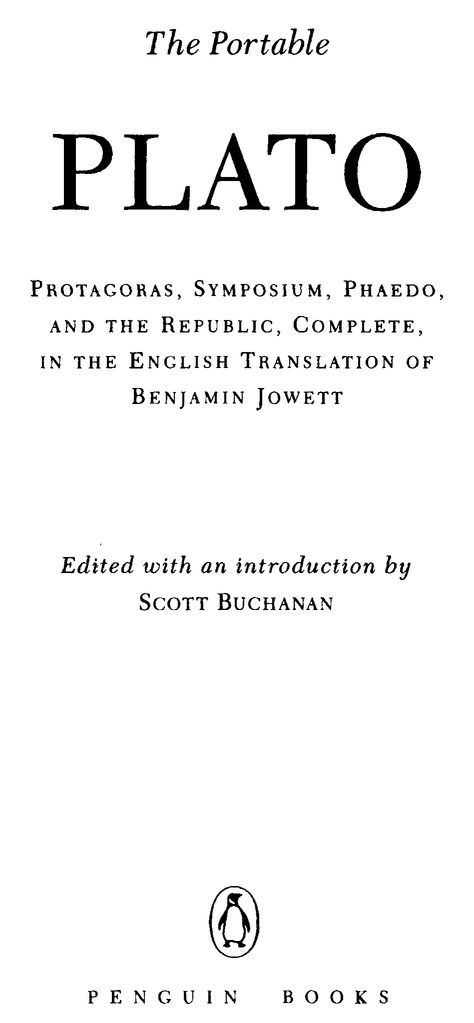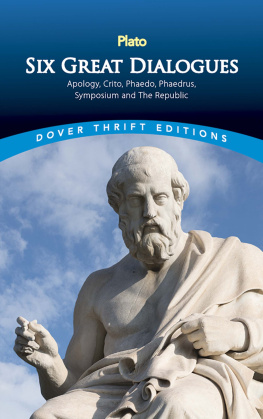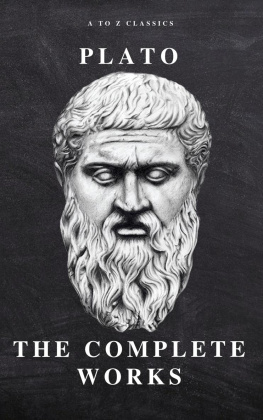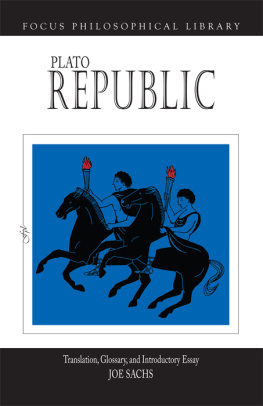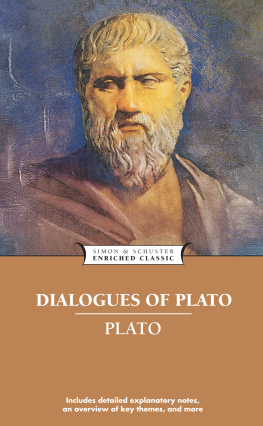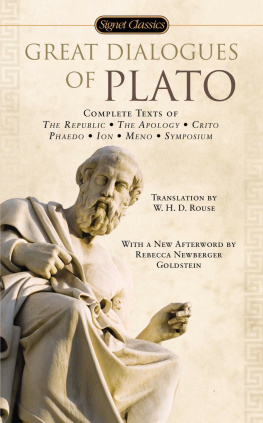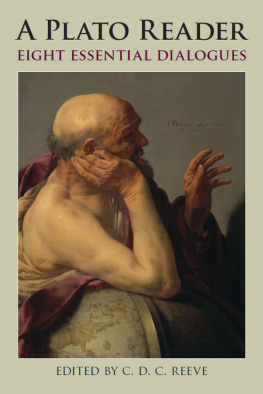Table of Contents
THE VIKING PORTABLE LIBRARY
Plato
Plato (c. 427-347 B.C.) stands with Socrates and Aristotle as one of the shapers of the whole intellectual tradition of the West. He came from a family that had long played a prominent part in Athenian politics, and it would have been natural for him to follow the same course. He declined to do so, however, disgusted by the violence and corruption of Athenian political life, and sickened especially by the execution in 399 of his friend and teacher, Socrates. Inspired by Socrates inquiries into the nature of ethical standards, Plato sought a cure for the ills of society not in politics but in philosophy, and arrived at his fundamental and lasting conviction that those ills would never cease until philosophers became rulers or rulers philosophers. At an uncertain date in the early fourth century B.C. he founded in Athens the Academy, the first permanent institution devoted to philosophical research and teaching, and the prototype of all western universities. He travelled extensively, notably to Sicily as political adviser to Dionysius II, ruler of Syracuse.
Plato wrote over twenty philosophical dialogues, and there are also extant under his name thirteen letters, whose genuineness is keenly disputed. His literary activity extended over perhaps half a century; few other writers have exploited so effectively the grace and precision, the flexibility and power, of Greek prose.
Scott Milross Buchanan (1895-1968) taught philosophy and religion at the College of the City of New York, the University of Virginia, and Fisk University. During his nine years as dean of St. Johns College at Annapolis, Maryland, he helped inaugurate and implement its great books curriculum. His books include Possibility and Poetry and Mathematics.
Each volume in The Viking Portable Library either presents a representative selection from the works of a single outstanding writer or offers a comprehensive anthology on a special subject. Averaging 700 pages in length and designed for compactness and readability, these books fill a need not met by other compilations. All are edited by distinguished authorities, who have written introductory essays and included much other helpful material.
EDITORS INTRODUCTION
IN THE year 1948 the reading of Platos dialogues by a large number of people could make the difference between a century of folly and a century of wisdom for the world. Reading The Republic has made that difference at various times of crisis in the past. A young American who reads Plato now may sympathize with the youthful Alexander who must have shuddered to see the chaotic world that he was fated to conquer. Tutored by one of Platos pupils, Aristotle, Alexander read Plato. He gave a unique quality to the world that fell under his dominion: he was the first statesman in our tradition to see the world as one city. If there is a chance now of one political world without the dread necessity of conquest, it may come about partly because human virtue and political justice can still be seen in the mirror of Platos writings. Alexander was a conqueror and something less than a philosopher-king, but he did have the elements of a liberal education.
For many people in the past the reading of Plato has been the beginning of their deep liberal education. Such education takes devious ways and it has many by-products, some good, some bad, all of them disturbing. The first and most obvious symptom that it is taking effect is an incorrigible urge to question things that have always been taken for granted. The second stage of the disturbance is a feeling of shame that such questions have never been asked before. Partial recovery from this blow to pride is achieved by a rally to the attack, the supposed enemy being conventional morality and opinion. The questions then come in Chinese puzzles, one inside the other, or in ranks, one behind the other in endless array. Apparently the conventions are easily routed, for they seem to melt away. Actually they have disguised themselves and changed sides, turning up everywhere as the assumptions behind the questions. The result at this point is panic, confusion, and paralysis.
Bright boys in college blame their teachers and protest in anger when this happens to them. Only later do they know that a splinter of Socratic irony has lodged in their souls for which they will always be grateful. In a similar mood Mens, a grown man, reports his pain thus:
O Socrates, I used to be told, before I knew you, that you were always doubting yourself and making others doubt; and now you are casting your spells over me, and I am simply getting bewitched and enchanted, and am at my wits end. And if I may venture to make a jest upon you, you seem to me both in appearance and in your power over others to be very like the flat torpedo fish, who torpifies those who come near him and touch him, as you have now torpified me, I think. For my soul and my tongue are really torpid, and I do not know how to answer you; and though I have been delivered of an infinite variety of speeches about virtue before now, and to many personsand very good ones they were, as I thoughtat this moment I cannot even say what virtue is. And I think you are very wise in not voyaging and going away from home, for if you did in other places as you do in Athens, you would be cast into prison as a magician.
And the Socratic response to the protest is not altogether comforting:
As to my being a torpedo, if the torpedo is torpid as well as the cause of torpidity in others, then indeed I am a torpedo, but not otherwise; for I perplex others not because I am clear, but because I am utterly perplexed myself. And now I know not what virtue is, and you seem to be in the same case, although you did once perhaps know before you touched me. However, I have no objection to join with you in the enquiry.
So the reader of Plato joins Socrates in inquiry, as Sancho Panza joined Don Quixote, for adventures of the mind. And although there is a deep consent, like a fire kindled deep in the mind, there is always a tension between the squire and the knight-errant, the little man with proverbs for wisdom riding on a donkey and the knight with the piercing eye riding on a horse, those two parts of each human soul. The intellectual destiny that each of us has depends upon who gets the upper hand, knight or squire.
Too often it is the squire that masters the knight and drags him off the unbeaten track. The record shows that readers of Plato become Platonists and ride donkeys. Seeing the battle with the conventions as the rivalry of opinions, they choose what seems to be the winner, call it the truth, and spend the rest of their lives in defense, challenging all comers. This was already happening before Socrates died. Some, noting the argument, recorded in the Protagoras, to show that pleasure is the good, set up the Cyrenaic School of philosophy which later combined with the atomism of Democritus to make the doctrine of Epicureanism. Others noted the opposing doctrine that the good is virtue, and virtue is knowledge, and became Cynics and later Stoics. It is true that these riders of Platonic donkeys have ruled islands, as the leaders of these schools did, and some of them ruled empires, as the Roman Stoics did, but the shock of reading Plato and touching Socrates has, as a piece of education, proved abortive in them. It may be that some of these caught the vision of the idea and, feeling its power, rode a horse, but they allowed the donkey to lead them down familiar roads where convention puts vision to sleep.


